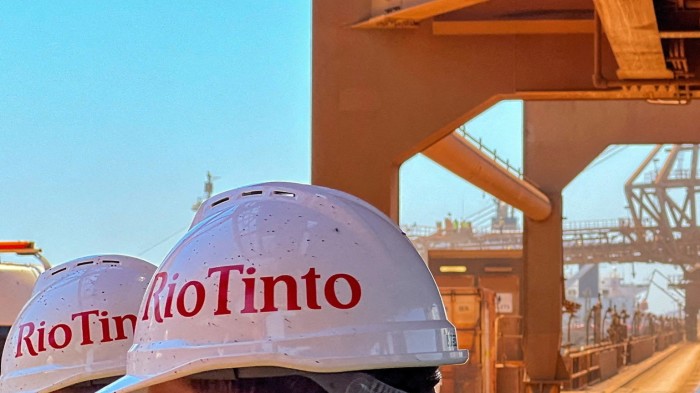The number of Rio Tinto employees who said they had experienced actual or attempted sexual assault or rape across its operations has risen in the past two years, despite the company’s efforts to improve its workplace culture and stamp out such behaviour.
The Anglo-Australian miner published a report on Wednesday that found “mixed results” in progress on combating sexual assault, bullying and racism since a previous report in 2022. It also highlighted a backlash against its gender and diversity policies from some of its workers.
The new report showed eight employees said they had experienced actual or attempted sexual assault or rape in the previous 12 months, up from five in the 2022 report, while 32 said they had experienced pressure or requests for “sex or sexual acts”, down from 37 two years earlier. The majority of those affected were female, according to the report.
Chief executive Jakob Stausholm said he was “disturbed by the fact that people are being hurt by bad behaviour”.
He added that the increase in reported cases partly reflected people’s greater willingness to come forward, after years of work by Rio to improve its workplace culture.
Stausholm said Rio would press on with its programme of culture change and training. “We are not going to let go,” he said.
Rio’s 2022 report about incidents of sexual assault, rape, racism and bullying across its global operations, compiled by Australia’s former sex discrimination commissioner Elizabeth Broderick, set out a number of recommendations for the company to improve the safety of its workers.
Its publication came against a backdrop of a wider reckoning among mining companies. The industry had been rocked by a parliamentary enquiry by the Western Australian government that revealed incidents of sexual assault and harassment across the sector at ‘fly-in fly-out’ operations run by companies including Rio, BHP and Fortescue.
Of the 11,600 people interviewed for the new report — either online, in person or via written submissions — 7 per cent said they had experienced sexual harassment and 7 per cent said they had experienced racism, the same proportions as in the previous report. The number that complained of bullying increased to 39 per cent from 31 per cent.
The report said the increase in bullying, mainly against women, was at least partly triggered by a backlash against the company’s diversity initiatives. “This change can be explained by a range of factors including increasing retaliation in the form of gendered bullying as a response to Rio Tinto’s efforts to promote gender diversity and inclusion,” it said.
Kellie Parker, chief executive of Rio Tinto’s Australian business, told the Financial Times that the backlash reflected wider concerns in societies where the miner operates over whether people were being treated fairly. “People know the world is changing and react to that,” she said.
She added that the company needed to explain better its attempts to overhaul its culture in order to ensure staff around the world felt they were being treated fairly. She said she was confident the workforce would adapt but stressed that Rio Tinto would not tolerate “extreme” behaviour and had fired a number of people over bullying.
The progress report published on Wednesday has been viewed as a key metric to measure how the company’s employees had responded to the bombshell 2022 findings.
About half the respondents thought the company had improved with regards to bullying and sexual harassment, while 8 per cent thought bullying had worsened and 2 per cent thought sexual harassment had become worse.
Rio chair Dominic Barton pledged at last year’s Financial Times Mining Summit in London to publish the progress report and said it was important to hold the company to account.
At the same conference, Broderick said she was keen to see how Rio Tinto’s culture had changed, rather than the company ticking off requirements from the original report, and cited examples of where employees had intervened to stop inadvertent examples of racism or sexism as signs of progress.
Bonuses at Rio Tinto have been linked to progress made in adopting Broderick’s recommendations.
Read the full article here

